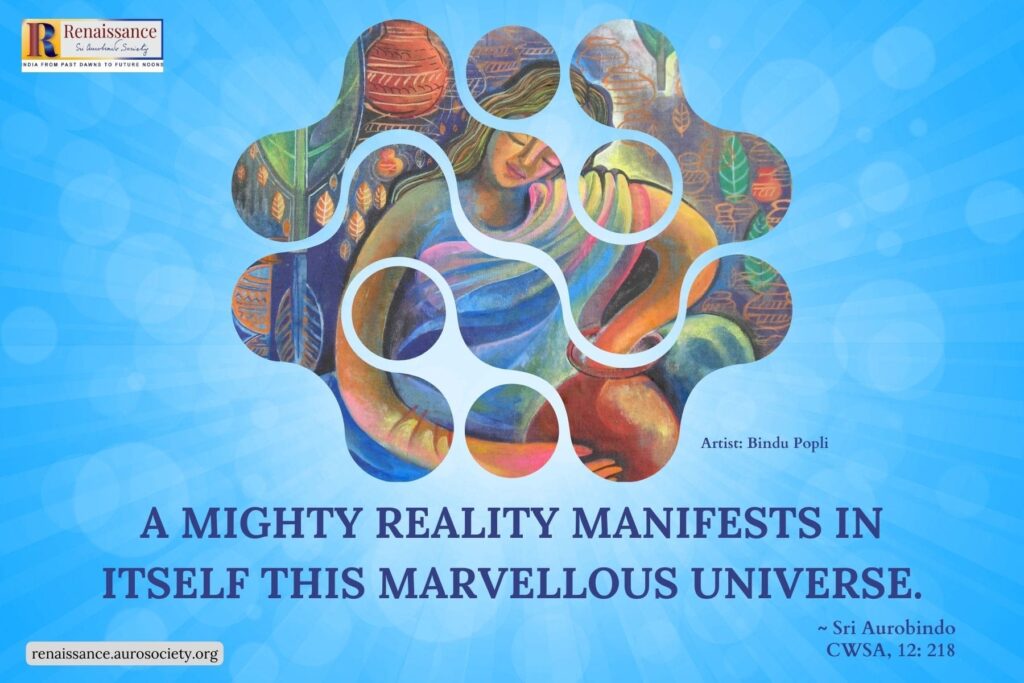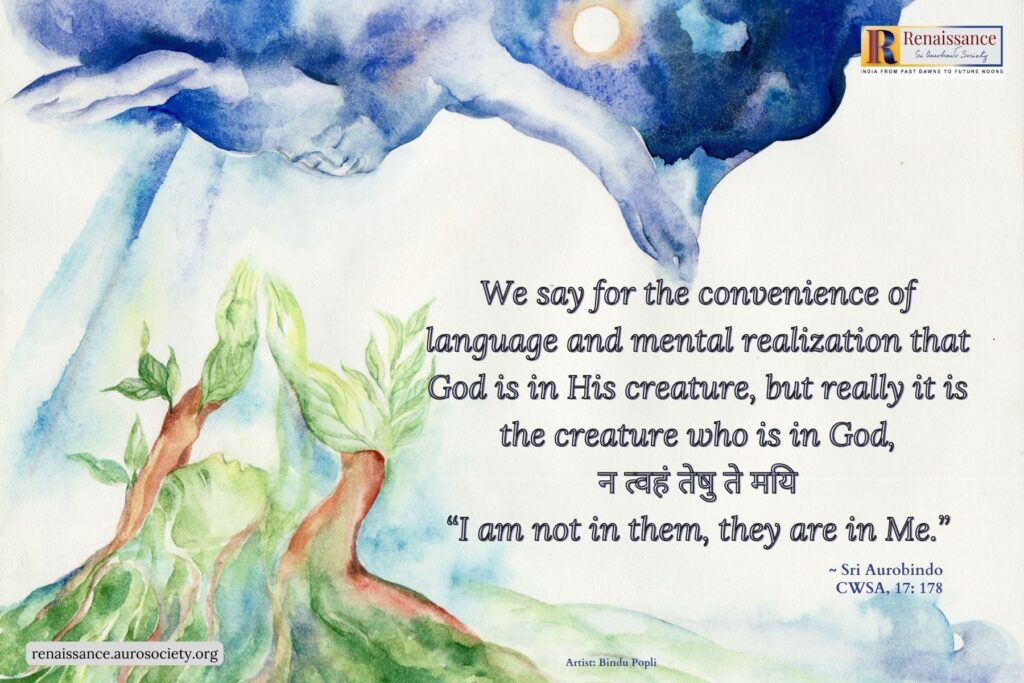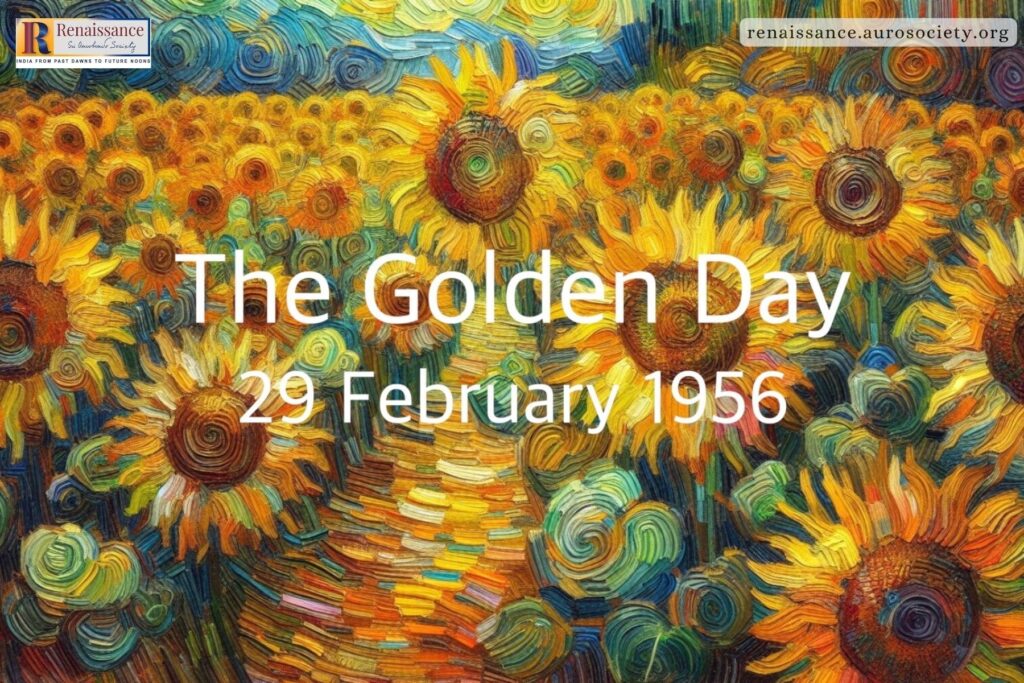Editor’s note: Presented here is a short essay by Sri Aurobindo in which he explains that “God must be beyond limitation by our ideas of good, otherwise the universe such as it is could not exist whether as the partly manifested being of a divine Existence or a thing created or permitted by a divine Will.”
This is followed by a conversation of the Mother where we get answer to the question – if God is all good and sarvamangalam, from where does evil come? If we want to truly understand the nature of the universe, the Mother tells us clearly: “You must first of all come out of yourself, and then unite with the infinite and only afterwards can you begin to understand what it is, not before.”
The editors have made a few formatting revisions for the purpose of online presentation. No change has been made in the original text.

Beyond Good and Evil: Words of Sri Aurobindo
God is beyond good and evil; man moving Godwards must become of one nature with him. He must transcend good and evil.
God is beyond good and evil, not below them, not existing and limited by them, not even above them, but in a more absolute sense excedent and transcendent of the ideas of good and evil.
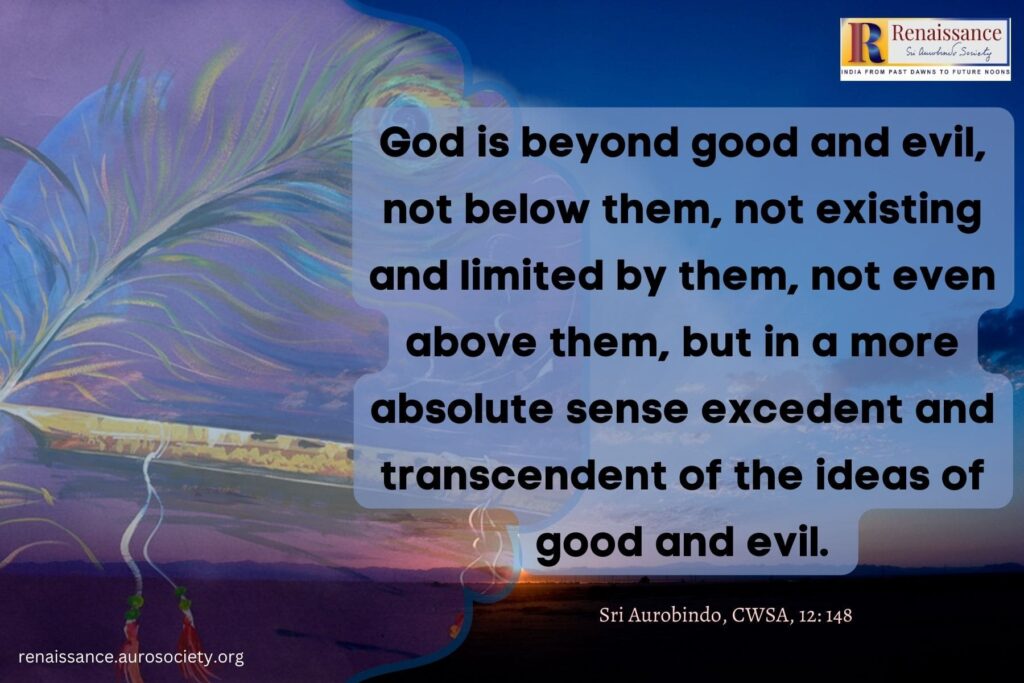
He exceeds them in his universality; they exist in him, but the values of good and evil which we give to things is not their divine or universal value, they are only their practical value created by us in our psychological and dynamic dealings with life.
God recognises them and seems to deal with us on the basis of this valuation of life, but only to such an extent as may serve his purpose in Nature. In his universal action he is not limited by them.
But into his transcendent being of which his highest universal is the image, they do not at all enter; there in the highest universal which is to us transcendent is only the absolute good of which both our good and evil have in them certain differentiated elements.
Neither our good nor our evil are or can of themselves give the absolute good; both have to be transformed, evil into good, good into pure and self-existent good, before they can be taken up into it.
This explains the nature of the universe which would otherwise be inexplicable, inconsistent with the being of God, a forcefully inconscient and violently active enigma.
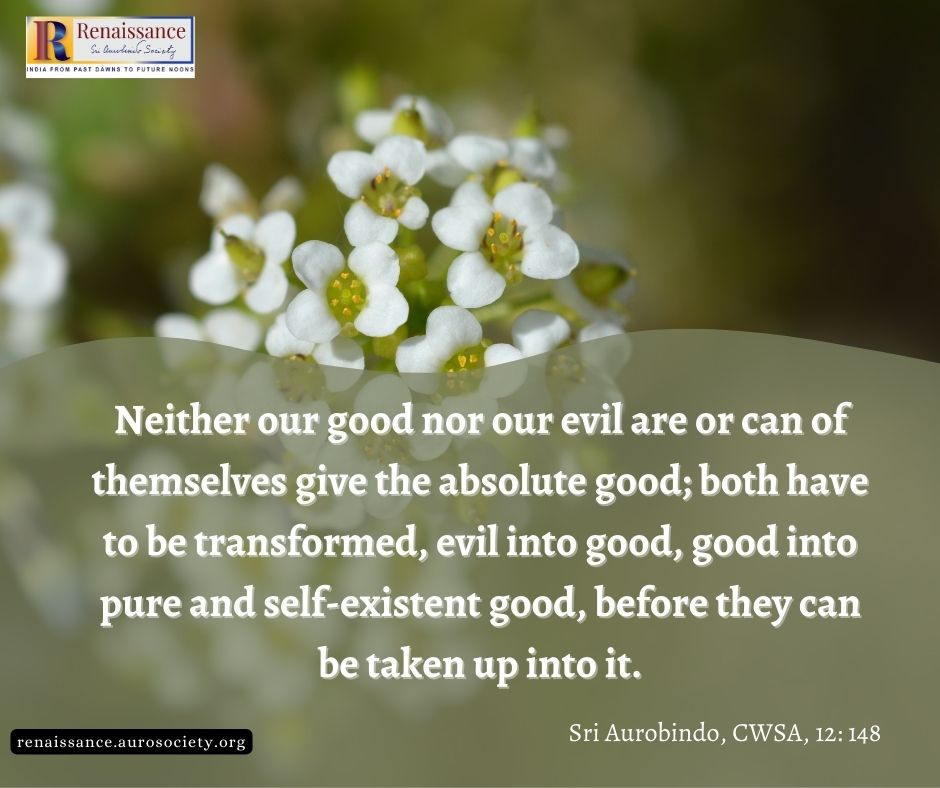
God must be beyond limitation by our ideas of good, otherwise the universe such as it is could not exist whether as the partly manifested being of a divine Existence or a thing created or permitted by a divine Will.
He cannot, either, be evil, otherwise in man, his highest terrestrial creature or his highest terrestrial manifestation, there could not be this dominant idea of good and this stream of tendency towards righteousness. He cannot be a mixture of good and evil, whether a self-perplexed and struggling or a mysteriously ordered double principle, Ormuzd and Ahriman, or at least he cannot be limited by this duality, for there is much in the universe which is neither good nor evil.
Perhaps the greatest part of the totality is either supramoral or inframoral or simply amoral.
Good and evil come in with the development of mental consciousness; they exist in their rudimentary elements in the animal and primitive human mind, they develop with the human development.
Good and evil are things which arrive in the process of the evolution; there is then the possibility that they will disappear in the process of the evolution. If indeed they are essential to its highest possible point of culmination, then they will remain; or if one of them be essential and the other non-essential, then that one will remain and its opposite will disappear.
~ Sri Aurobindo, CWSA, Vol. 12, pp. 148-149
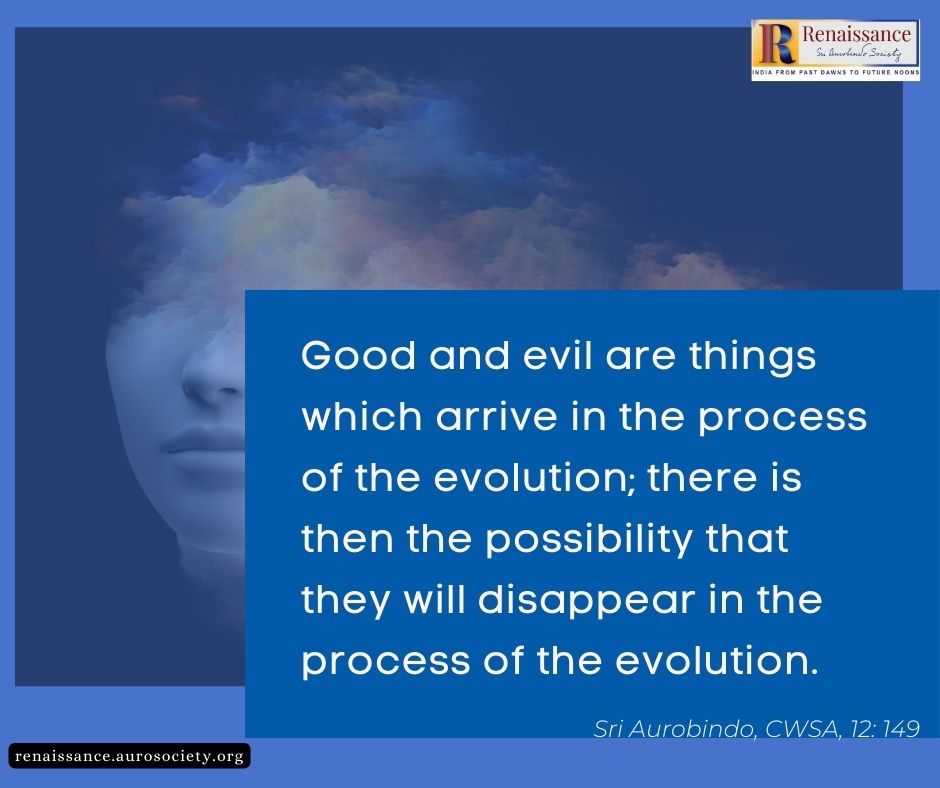
Of Form-makers and Evil: The Mother Explains
Disciple: If the Divine that is all love is the source of the creation, whence have come all the evils abounding upon earth?
All is from the Divine; but the One Consciousness, the Supreme has not created the world directly out of itself; a Power has gone out from it and has descended through many gradations of its workings and passed through many agents.
There are many creators or rather “formateurs”, form-makers, who have presided over the creation of the world. They are intermediary agents and I prefer to call them “Formateurs” and not “Creators”; for what they have done is to give a form and turn and nature to matter.
There have been many, and some have formed things harmonious and benignant and some have shaped things mischievous and evil. And some too have been distorters rather than builders, for they have interfered and spoiled what was begun well by others.
~ The Mother, CWM, Vol. 3, p. 102
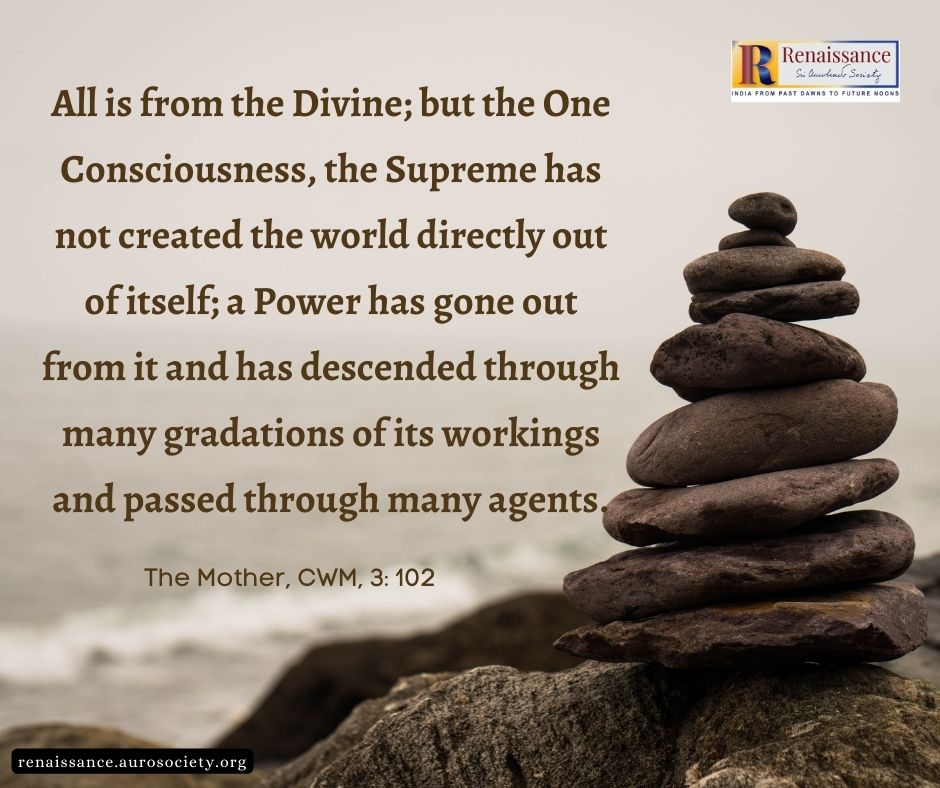
Q: You say, “Many creators or rather ‘formateurs’, form-makers, have presided over the creation of the world.” Who are these ‘formateurs’?
That depends. They have been given many names. All has been done by gradations and through individual beings of all kinds. Each state of being is inhabited by entities, individualities and personalities and each one has created a world around him or has contributed to the formation of certain beings upon earth.
The last creators are those of the vital world, but there are beings of the Overmind (Sri Aurobindo calls this plane the Overmind), who have created, given forms, sent out emanations, and these emanations again had their emanations and so on.
Also read:
Sri Aurobindo on the Principle of Evil
What I meant is that it is not the Divine Will that acted directly on Matter to give to the world the required form, it is by passing through layers, so to say, planes of the world, as for example, the mental plane—there are so many beings on the mental plane who are form-makers, who have taken part in the formation of some beings who have incarnated upon earth.
On the vital plane also the same thing happens. For example, there is a tradition which says that the whole world of insects is the outcome of the form-makers of the vital world, and that this is why they take such absolutely diabolical shapes when they are magnified under the microscope. . . .
Q: Did these intermediaries also come out of the Divine Power?
Through intermediaries, yes, not directly. These beings are not in direct contact with the Divine (there are exceptions, I mean as a general rule), they are beings who are in relation with other beings, who are again in relation with others, and these with still others, and so on, in a hierarchy, up to the Supreme.
Q: If they came out of the Divine, why are they evil?
Evil? I think I have explained that to you once: just by not remaining under the direct influence of the Divine and not following the movement of creation or expansion as willed by the Divine; this rupture of contact is enough to produce the greatest of disorders, that of division.
Well, even the most luminous, the most powerful beings may choose to follow their own movement instead of obeying the divine movement.
And though in themselves they may be quite wonderful and if human beings saw them they would take them for the very Godhead, they can, because they follow their own will instead of working in harmony with the universe, be the source of very great evils, very great disorders, very great massive obstructions.
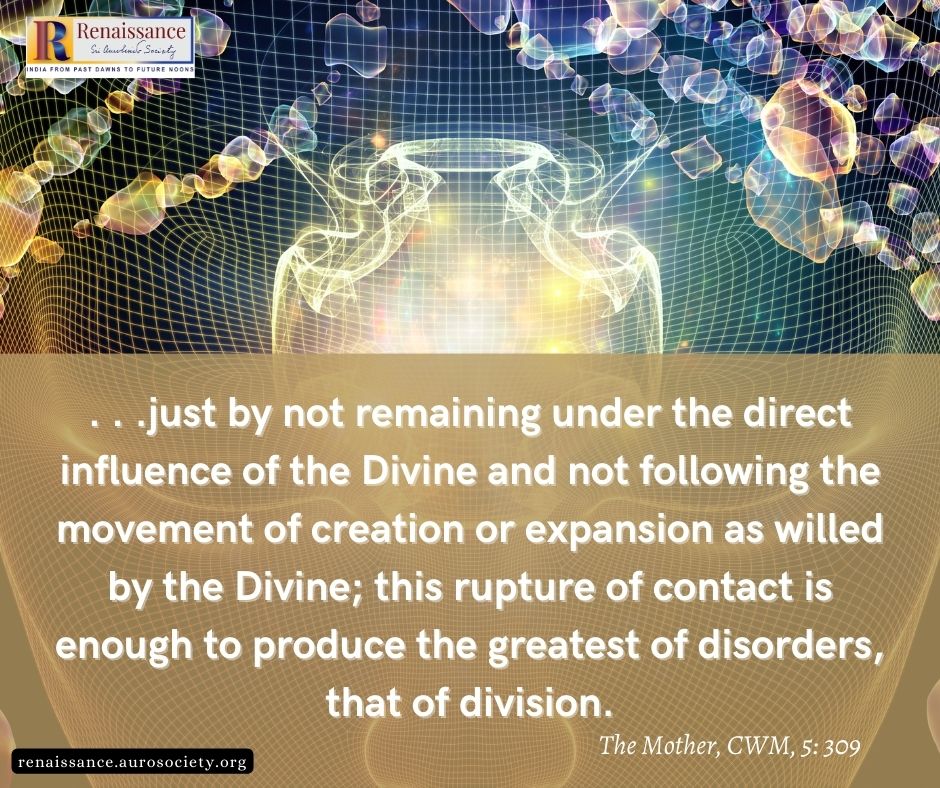
But don’t you see, the question is badly put, I laughed just now when I read the question.” It is a childish way of speaking. This person says: “If God is everything in the world, why are there evil things in the world?”
Now, if she had told me that, I would have simply answered: there is nothing which is not God, only it is in a disorder. One must try to remedy it—God is not love alone, He is all things, and if that appears to us—to us—altogether wrong, it is because it is not arranged properly. . .
You may ask why it happened. Well, certainly it is not the mind, you know, which can say why it happened. It happened, that is all. In reality the only thing that concerns us is that it has happened.
. . . If you look at the thing from a philosophical point of view, it is evident that the universe in which we live is a movement among many others and this movement follows a law which is its own (and which is perhaps not the same in the others), and if the Will was for the world to be built on the principle of choice, of the freedom of choice, then one cannot prevent disorderly movements from taking place until knowledge comes and the choice is enlightened.
If one is free to choose, one can also choose bad things, not necessarily the good, for if it were a thing decided beforehand, it would no longer be a free choice.
[. . .] To be able to understand, one must become. If you want to understand the why and how of the universe, you must identify yourself with the universe. It is not impossible but it is not very easy either, particularly for children.
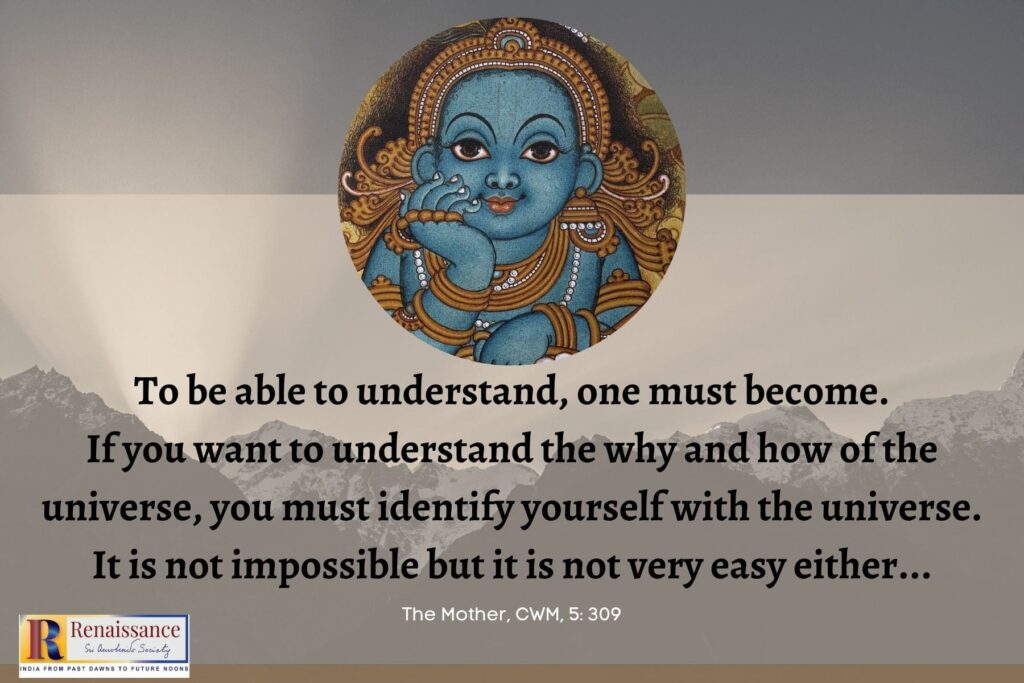
[. . .] “If He is just, why is there injustice? If He is good, why is there wickedness? If He is love, why is there hatred?”—But He is all! So He is not merely this or that, or only, exclusively this—He is all. That is, to be more correct, it should be said that all is He.
There are notions about creation, very widespread upon earth, which have been accepted more or less for a long time in human thought, that are quite simplistic! There is “something” (truly speaking, one does not know what), and then there is a God who puts this something into form and creates the world out of it.
So if you have such notions, you have a justifiable right to say to this God: “Well, you have indeed created a world, it’s a pretty one, that world of yours!” Although, according to the story, after seven days of labour, he declared that it was very good—but it was good for him.
Perhaps it may have amused him immensely, but as for us who are in the world, we do not find it good at all! Don’t you see, the conception and the way of putting it are altogether childish. It is just like the story of the potter who puts his pot in shape—this God is a human being, formidable in proportions and power, but looking strangely like a man.
It is man who makes God in his image, not God who makes man in his image!
[. . .] There is only one single solution to the problem—not to make any distinction between God and the universe at the origin.
The universe is the Divine projected in space, and God is the universe at its origin. It is the same thing under one aspect or another. And you cannot divide them.
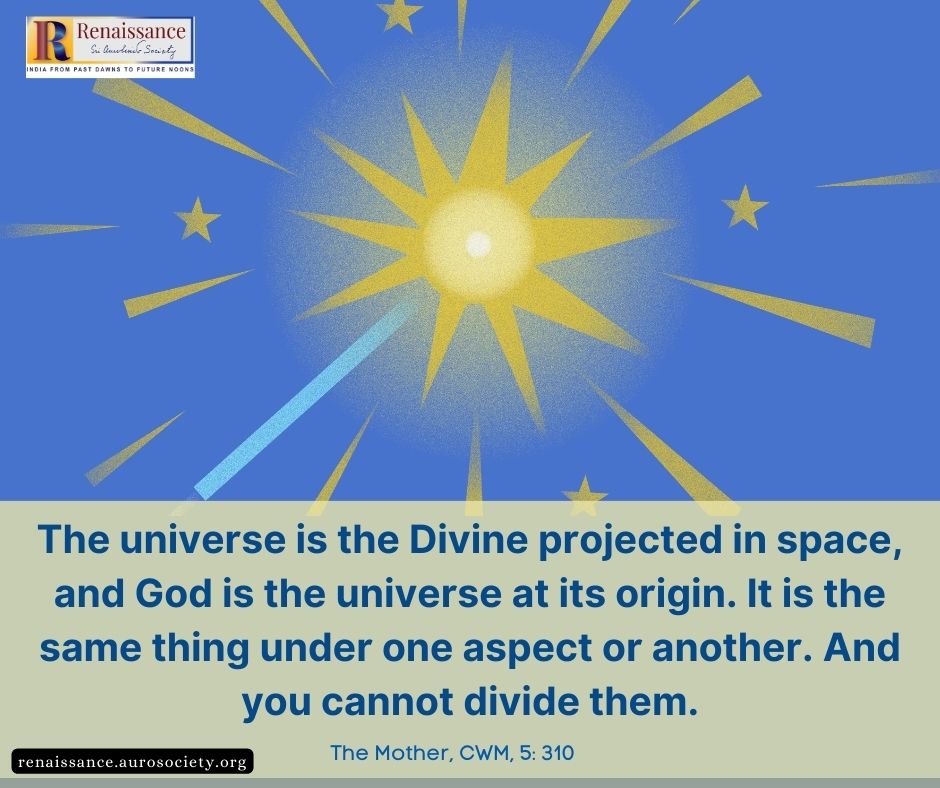
It is the opposite conception to that of the “creator” and his “work”. Only, it is very convenient to speak of the creator and his work, it makes explanations very easy and the teaching quite elementary. But it is not the truth.
And then you say: “How is it that God who is all-powerful has allowed the world to be like this?” But it is your own conception! It is because you yourself happen to be in the midst of a set of circumstances that seems to you unpleasant, so you project that upon the Divine and you tell him: “Why have you made such a world?”
“I did not make it. It is you yourself. And if you become Myself once again, you will no longer feel as you do. What makes you feel as you do is that you are no longer Myself.” This is what He could tell you in answer.
And the fact is that when you succeed in uniting your consciousness with the divine consciousness, there is no problem left. Everything appears quite natural and simple and all right and exactly what it had to be. But when you cut yourself off from the origin and stand over against Him, then truly everything goes wrong, nothing can go right!
But if you ask for a logic that pushes things to the extreme end, you question how it is that the Divine has tolerated parts of his own self to be separated from him and all this disorder to be created. You may say that. And I then will reply: “If you want to know, it is better to unite yourself with the Divine, for that is the only way of knowing why He has done these things.”
It is not by questioning Him mentally, for your mind cannot understand.
And I repeat it, when you reach such an identification, all problems are solved. And this feeling that things are not all right and that they should be otherwise, comes just because there is a divine will for a constant unfolding in perpetual progress and things that were must give place to things that shall be and shall be better than what the others were. And the world that was good yesterday is no longer good tomorrow.
The whole world that could appear absolutely harmonious and perfect at one time, well, today it is discordant, no longer harmonious, because now we conceive and see the possibility of a better world. And if we were to find it all right we would not do what we ought to do, that is, make the effort needed for it to become better.
[. . .] With this consciousness which is your own, which is like a grain of sand in the infinite vastness, you want to know and judge the infinite? It is impossible.
You must first of all come out of yourself, and then unite with the infinite and only afterwards can you begin to understand what it is, not before. You project your consciousness—what you are, the thoughts you have, the capacity of understanding you have—you project this upon the Divine and then say: “That is all wrong.”
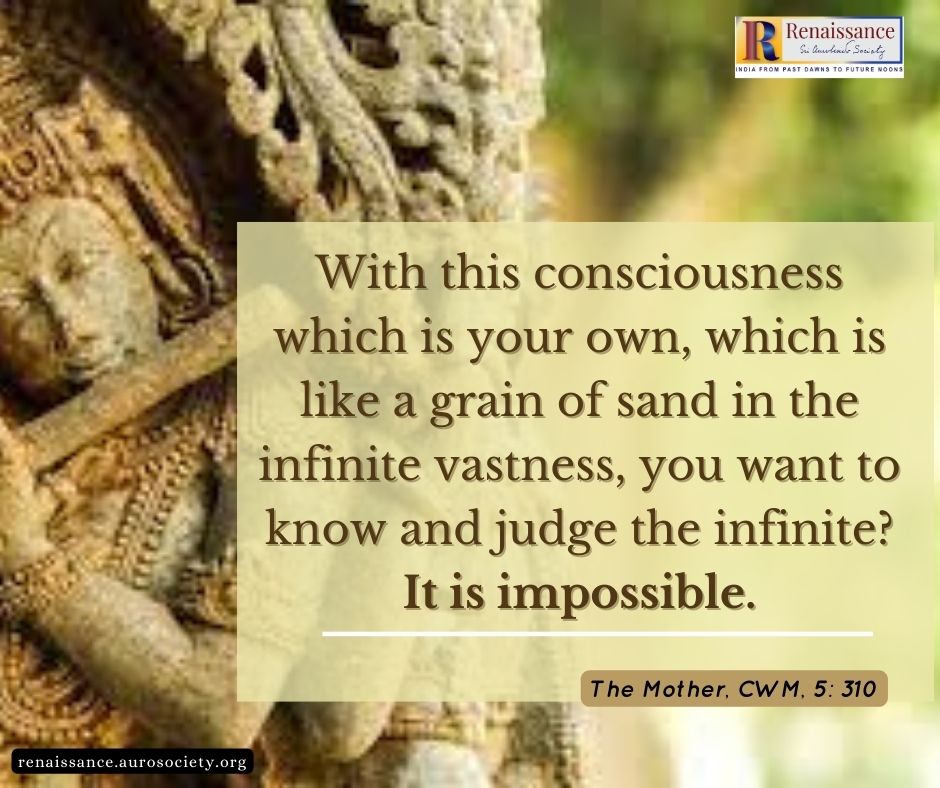
. . . there is no possibility of knowing unless you identify yourself. I do not see how, for example, a drop of water could tell you what the ocean is like. That’s how it is.

~ Design: Beloo Mehra

